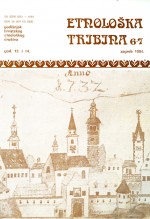Osvrt na neke od podataka Štefana Kocijančiča u Arkivu za povjestnicu jugoslavensku, na njihovo značenje i ulogu u našim znanstvenim istraživanjima
Reviewing Certain Data by Štefan Kociančič in the Arkiv za povjestnicu jugoslavensku and its Significance and Role in Our Scientific Research
Author(s): Jasna AndrićSubject(s): Customs / Folklore, Ethnohistory, Oral history, Cultural Anthropology / Ethnology, Philology
Published by: Hrvatsko etnološko društvo
Keywords: Štefan Kociančić; linguist and historian; culture and history of Slovenians and Frulians and Italians; oral history; ethnology; Španjolci (Spaniards); Ugri (Hungarians); Bezjak;
Summary/Abstract: Štefan Kociančič, a linguist and historian who lived in Gorica, published contributions in Arkiv za povjestnicu jugoslavensku HI, Zagreb 1854. They offer numerous data on culture and history of western Slovenes and their neighboring Friulians and Italians. The subject of this discussion is data on the names »Španjolci« (Spaniards), »Ugri« (Hungarians) and »Bezjak« which appear in that area either in use as nick-names of some groups of inhabitants, or in oral history. The name »Španjolci« appears along the coast from Istria to Montenegro, and inland in Metohia. In folk narrative poems it often stands for »Maurs«. As for the name »Ugri«, Kociančič recorded oral history associated with the village Vogrsko near Gorica, as well as myths about Atilla. The author of this article compares Kociančič’s data with that from Bosnia where there are also numerous myths on »Ugri«, and where Croats are sometimes referred to as »Magyars«. The name »Bezjak« is used as both personal and group nick-name in Croatian Zagorje, in the Kupa basin and in Istria. Kociančič recorded it at the Slovene-Italian linguistic border where it most often has a derogative meaning, and denoted a local mixture of either Italian and Friulian languages, or Slovene and Italian. There are sources from the 16’h and the 17th centuries, as well as from recent times, which indicate that the name »Bezjak« (pi. »Bezjaci«) was used also by Croats in reference to some groups who spoke a specific tongue and presumably were of different (or mixed) ethnic origin.
Journal: Etnološka tribina : Godišnjak Hrvatskog etnološkog društva
- Issue Year: 13/1984
- Issue No: 6-7
- Page Range: 147-164
- Page Count: 18
- Language: Croatian

